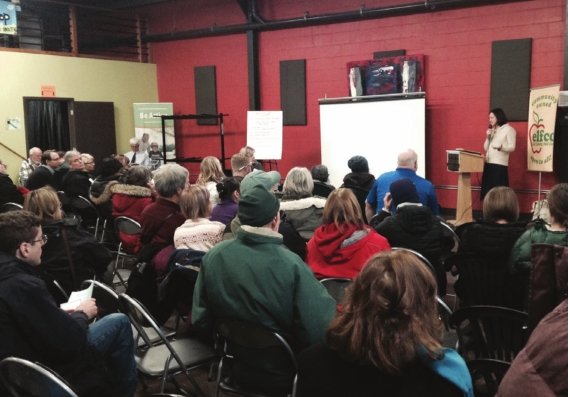
East Lansing Food Co-op owners decided almost unanimously to sell their store Sunday, with 114 votes yes to 7 no. With operations slated to officially stop Feb. 4, and no sign of the co-op disbanding, ELFCO must now decide its next steps.
“It is going to be quite a discussion. There were clearly a lot of ideas that had legs in this discussion today,” said Anne Woiwode, who heads the ELFCO Board of Directors. What's key is that "for 40 years we have moved forward incrementally without necessarily having a really comprehensive view," Woiwode said. "We've gotten a lot of good ideas and gotten good information, but what we don't have is a business plan that says, 'Here's the model that's going to work for the future.'”
The creation of that model rests on the shoulders of the few hundred active members of the cooperative. ELFCO’s enthusiastic, nearly 90-minute debate, held at the Allen Neighborhood Center in the eastside neighborhood, generated a slew of ideas to create revenue in a new space and ultimately set the goal to establish a new location as soon as possible.
Ideas ranged from the sale of prepackaged ready-to-eat foods, the creation of a cooperative-sponsored food truck and partnerships with local businesses like Go Green Trikes LLC for deliveries. Some members even volunteered to donate their personal funds to help ELFCO costs. Woiwode said that it will take future meetings to truly develop a “smart way” to move ahead.
“If we agree to borrow funds from our owners — there’s clearly a bunch of generous people in the room who were thinking that was a good option — how do we do our best by them and the whole cooperative, to have a plan that seems viable,” Woiwode said. “Whether it’s a food truck or a farmer’s market or do we start small and scale up? And all those things will have to be thought through.”
Still, many of the suggested solutions rely on the existence of a new physical location to function. In the time before the building at 4960 Northwind Drive in East Lansing, which is listed for $675,000, can be sold, funds will stop coming in, and the cost of a new space will be expensive. Various reports from the co-op’s own documents estimate a new store costing anywhere from $800,000 to $2 million.
This cost is largely why the few who did vote against the sale, like ELFCO’s former general manager, David Finet, were apprehensive about losing potential landlord revenue to put toward a new location.
“Nobody’s asked the question of what we could rent the building for, of what we could rent the space that we will be vacating,” Finet said. “That with the rent that we’ve got plus the fact that the building’s in pretty good shape, we could have easily kept the building for now, and generated revenue to help us launch the co-op perhaps somewhere else. But I think just taking a cash out right now with no way of generating cash is a mistake.”
Still, with the building gone, many expenses like building maintenance will disappear.
One ELFCO owner, MSU employee Connor Meston, suggested a means for the co-op to generate income and marketing clout in the community, particularly with fellow college students.
“If ELFCO could come up with some kind of location in East Lansing that they could have maybe a small distribution point, where they could at least take orders from a point near downtown East Lansing, that would be an interesting way to reach out to sell bulk food to students,” Meston said. “Especially houses in the student housing cooperative or other group housing, whether it’s a housing cooperative or a fraternity or sorority.”
This method might at the very least help the community outreach efforts of the organization, something that board member John Reich said was one of the contributors to the store’s closure.
“The problem that the co-op had was that there wasn’t enough people that were willing to patronize the co-op to make it sustainable. Whether that was because of marketing or because they didn’t know it was there, I don’t know,” Reich said. “There’s a lot of reasons you could say that it didn’t succeed, but the bottom line is there simply wasn’t enough business volume to make it viable.”
For now, ELFCO members must digest the decision made and move forward toward its physical revival. But even before then, work must be done to maintain the cooperative’s relationship with local food providers and the support of its members.
“I hope that we’re able to move ahead pretty quickly with the enthusiasm that’s there,” Woiwode said. “I know for me, just figuring out where to shop next is going to take some energy, and I’m looking forward to having a really good discussion about what the options are at the next board meeting. Beyond that we’re going to just jump in. Folks who are interested need to get going.”
Support City Pulse - Donate Today!
Comments
No comments on this item Please log in to comment by clicking here